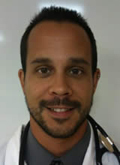
I don’t want to leave Rwanda, but the time has come for a change. Haiti has been calling me since I last left two years ago and the longer I stay in Rwanda, the less likely it seems that I’d get back to Haiti. So I’m leaving, and going home.
My life in global health has almost always revolved around Latin America and the Caribbean. Until two years ago, I never thought that I’d work in Africa. It was too far, too exotic, too culturally different. In my head it was oppressively poor, even though Haiti is one of the five poorest countries in the world by most measures. Now, after 18 months in Uganda and Rwanda, I am coming home, taking an easy route. Since the earthquake in 2010, I knew Haiti was where I wanted to build my career and now that that goal is in sight, I feel uneasy. My biggest fear with moving to Miami and Haiti is that I’m moving to the place I’ll live the rest of my life. The move feels confining, like I am settling into a post-retirement home, the last I’ll ever own. I realize I’m not being locked in by a white picket fence, and that only the twisted people in my line of work could consider living in Miami and Haiti a boring existence, but I still feel like I’m doing what’s been preordained for my life.
Am I making the right decision to leave? The new job is far from set. We’re trying to set up a global health training program, but there are a number of financial and structural barriers. Every time I’ve met with people in Miami, they smile and say, “This looks like a worthwhile project. We’ll continue to talk about it.” They shake my hand, and I leave while they sigh and think that it’s another do-gooder project destined to fail for lack of funding.
Last month, I sent three resignation emails in one night: one each to Partners in Health, Harvard and the hospital in Rwanda. Having to put into words that I’m quitting makes me feel like, well, a quitter. “I regret to inform you that, for personal and professional reasons…” It doesn’t matter that I am making an upward career move, or going home. I am still abandoning people I’ve worked with for a long time, telling them the work that we did together wasn’t enough to keep me there.
In Rwinkwavu, where I spent the night, only two people received the resignation email. As I rounded at the hospital in the morning, I continued to enjoy the simple pleasure of being a doctor. In the afternoon, I went to the headquarter office and was greeted by long faces, many faces I will probably never see again.
“I heard you’re leaving to Miami. Do you have a job yet? Are you going to be alright?” Several of my colleagues, who live in the reality of an economy with chronic, massive unemployment, were concerned about my next step and wanted to make sure I wasn’t going to wander the streets indefinitely. They were sad to see me leave but were happy I had a great job to go to. My fear of abandoning friends melted away. My Rwandan friends are accustomed to mzungus coming and going, and they understood that my time had come.
I packed up the last of my clothes from Rwinkwavu where I had lived for a year. I left behind socks with holes in them and impossibly stretched-out underwear, and gave away toothpaste and bug spray. The act of emptying a torn plastic garbage bag of clothes into a backpack for the last time choked me up as I realized that I won’t be coming back to Rwinkwavu, possibly ever.
I packed up my room in Butaro in the north of Rwanda the night before I left. Worn-out clothing that would be unusable at home was once again left behind, as were a few bottles of hot sauce and a jar of protein powder, both invaluable in the land of flavorless rice and beans.
My colleagues threw a send-off party on my last day in Rwanda, and the water works began, mostly from American colleagues. I held back my tears, as men are simply not allowed to cry in Rwanda, even at funerals. I had learned so much about medicine, policy and politics from them. They smoothed some of my rough edges, like my big mouth, and stood by me no matter the trouble. I hope that in return I hardened some of their softer spots.
The moment of goodbye that I had been dreading arrived. I decided I’ll miss the orange dust so thick in the air during the dry season that you constantly feel the grit in your teeth. I’ll miss walking toward the beacon of lights a mile away in the pitch black night, knowing that they could only be coming from my home. I’ll miss the sweaty smell of the internal medicine ward, and the 20 pairs of eyes that looked to us for help every morning when we began rounds. I may even miss the children yelling, “Mzungu! Mzungu!” as I jog by them.
On that final day a friend asked, “Are you excited to be going home?” I thought for a moment as I heard a door to the office next to us close.
“Yeah,” I paused. “Yes, I am.”
Vincent DeGennaro is an internal medicine doctor and a global public health specialist in the Department of Global Health and Social Medicine, Harvard Medical School. See his An American Doctor in Rwanda blogs.